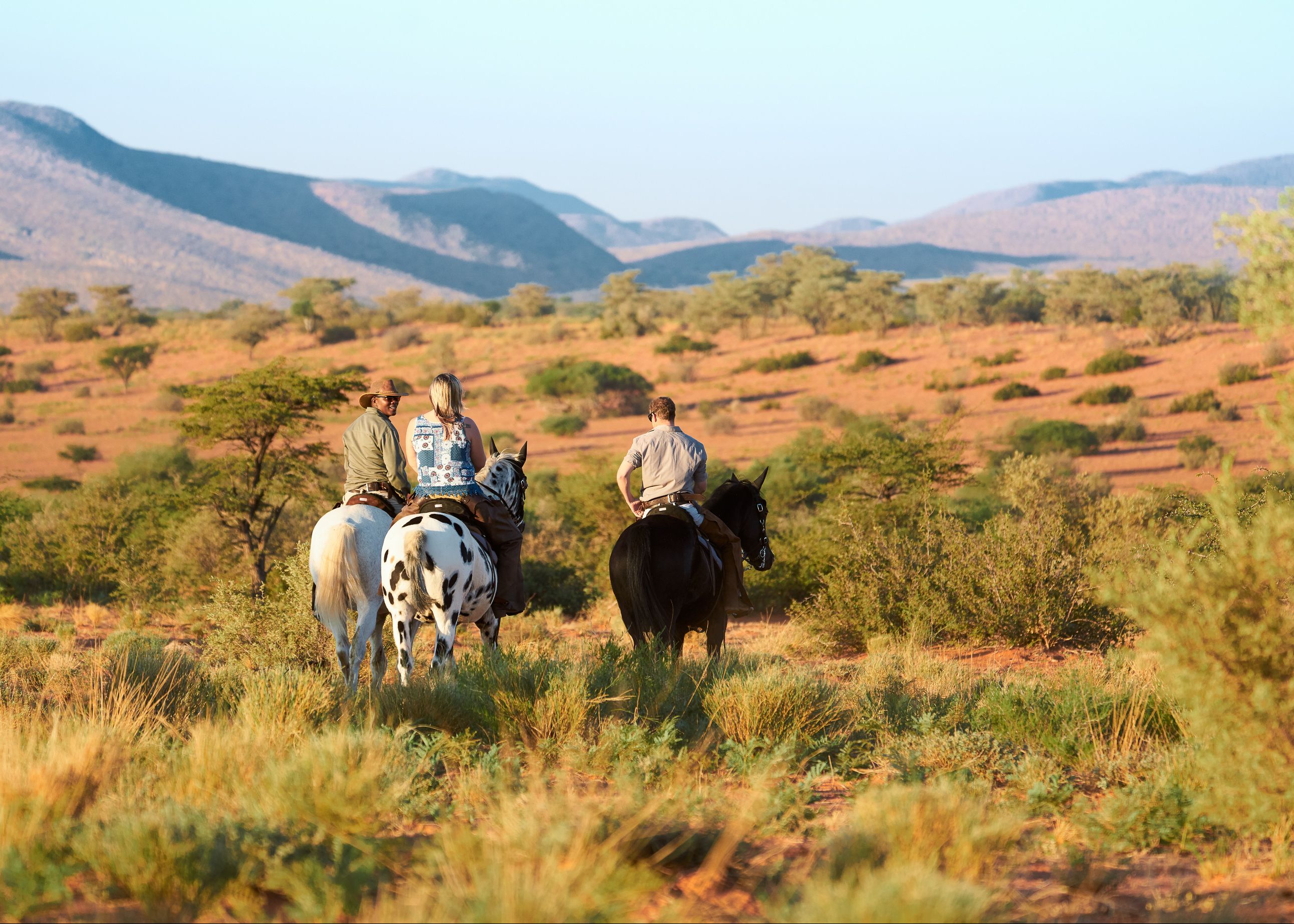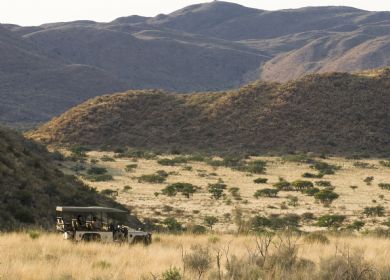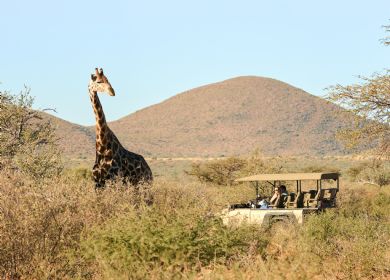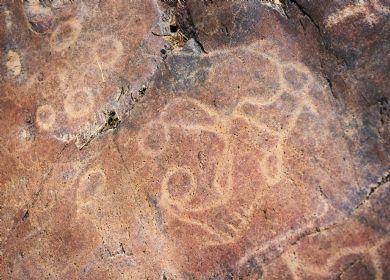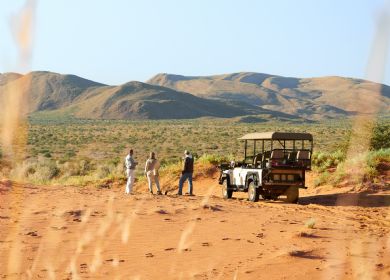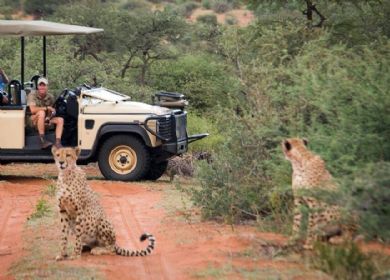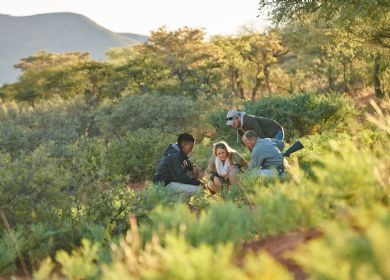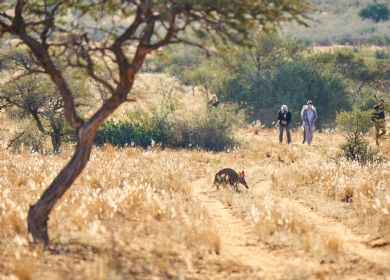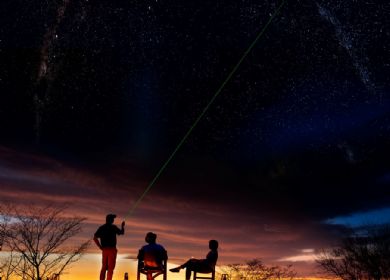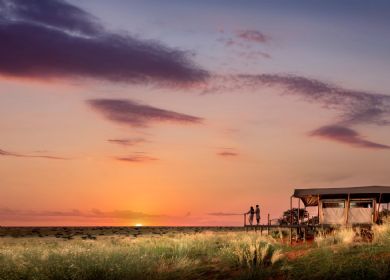
Sense of Space Tswalu
Tswalu Kalahari is South Africa's largest private game reserve. This vast and magical landscape takes conservation as its first priority; with its vision:
To leave our world better than how we found it.
Flexibility
No other game reserve offers such flexibility. Each booking receives their own private vehicle, guide and tracker. Your private, dedicated team gives you the flexibility to choose how you would like to spend your day – from breakfast in bed and an indulgent spa treatment in the comfort of your own deck overlooking the Kalahari, to a leisurely game drive, and a delicious private gourmet picnic which reflects the essence of Africa.
Malaria-free Safari
Tswalu is MALARIA-FREE and guests do not have to worry about taking anti-malaria tablets. It is ideal for families, and at Tswalu we welcome children and actively encourage them to participate fully in the safari experience.
Rare and Diverse Wildlife
Tswalu has superlative game, offering sightings of some of South Africa's rarest and most extraordinary wildlife, including:
• Desert black rhino - Tswalu's population represents one third of South Africa's entire remaining desert black rhino
• White rhino
• Black-maned Kalahari lions
• Leopard
• Disease-free buffalo
• Wild dogs
• Cheetah
• Meerkats
• Giraffe
• Rare antelope such as roan, sable and tsessebe - Tswalu has significant populations of all three species.
There are over 80 species of mammals and 240 species of birds (including endangered raptors), at Tswalu, which is also home to the elusive aardvark, aardwolf, pangolin and brown hyena.
Ancient San Artworks
The Kalahari is the ancestral home of the San people, and some of their ancient engravings can be seen at Tswalu; current research suggests these may be amongst the oldest artworks on Earth.
Privacy and Exclusivity
At maximum capacity Tswalu will take only 28 adults in total – both camps combined. This represents the lowest imaginable density of visitors. The emphasis at Tswalu is on privacy and exclusivity – your own private Kalahari safari. Children are welcome at both camps.
The name Kalahari is derived from the Tswana word “Kgala”, meaning the great thirst, or “Kgalagadi”, meaning the waterless place. The southern Kalahari, due to its location and climatic conditions, receives somewhat more rain than the central Kalahari. It is for this reason that the southern Kalahari is frequently referred to as the “Green Kalahari”.
Within the reaches of Tswalu lie the Korranaberg Mountains, a quartzite formation attached to the Olifantshoek Supergroup. The mountains form a huge basin which acts as a natural catchment area and provides a healthy water table, enabling the reserve to support a large diversity of life.
Tswalu is a vast, magical land of infinite possibility, with sweeping vistas and a liberating sense of space. The green Kalahari is nature at its most diverse and surprising, and to spend time here is to be touched by exuberant, soulful beauty. Considered important for thousands of years, we’re now striving to conserve this breath-taking landscape for future generations.
Tswalu lets you reconnect with the richness of the earth. It offers an escape to a place that’s governed by the ancient rhythms of the seasons, rather than the clock and the calendar. It offers a vision of hope that brings together conservation, research and unrivalled safari experience. Everything we do is centred around our creed: To leave our world better than how we found it.
Because of its unique landscape, wildlife and safari experience, Tswalu works perfectly with any South African itinerary and provides the ideal partnership with both the Lowveld game farms and Cape Town.
The many San Engraving sites at Tswalu testify to the importance with which earlier inhabitants regarded the green Kalahari. It gave them sanctuary and both physical and spiritual nourishment. During the 20th Century, this link between people and their surroundings was disrupted by attempts at cattle farming and hunting.
Tswalu is a labour of love for the Oppenheimer family, who took responsibility for this remarkable reserve in 1998. Since then, their commitment to conservation has seen indigenous species re-introduced, and real strides made towards the restoration of the Kalahari, and the undoing of years of neglect.
In its new incarnation as a private nature reserve and conservation success story, Tswalu is bringing this ultimate ambition a little closer each day: To leave the world better than how we found it.
There is a perception that the southern Kalahari is a sparse and desolate desert. In reality it is a semi-arid grassland with wide open savannahs and a
diversity of habitats. Tswalu is unique because it has typical Kalahari savannahs and sand dunes as well as the Korannaberg Mountains which increase
the biodiversity of the area enormously. The mountains also provide spectacular backdrops for the landscape.
The variety of habitat and climate have resulted in an extremely diverse animal population. There are about 80 species of mammals and 240 species
of birds. The open habitat makes for excellent game viewing.
Our vehicles have exclusive access to the entire reserve. There is no reason to queue for a sighting and no limit to the time guests can spend at
sightings, because they are not competing with other vehicles.
Many of the animals that guests can expect to encounter on a game drive (or horse ride or walk) are species that are seen in more traditional safari
areas (such as zebra, buffalo, giraffe, and white rhino) but many are also unique to the area, in particular the antelope. The Kalahari species include
gemsbok, springbok, eland, red hartebeest and more. In addition, there are great opportunities to see rare species which are seldom seen in the
traditional safari areas. These include roan and sable antelope, tsessebe, Hartmann mountain zebra and, of course, the desert black rhino.
The larger predators also offer excellent viewing opportunities. The Kalahari lions, although the same species as other lions across Africa, are famed
for their size and beautiful manes. The Kalahari grasslands lend itself to excellent cheetah viewing and wild dog are also regularly seen on game drives.
Tswalu's small carnivores offer perhaps the most special and unique sightings.
Meerkat viewing is unparalleled because the reserve has two colonies of habituated meerkats that have grown to trust people and allow close approach and observation. Apart from the more common small predators
such as jackal and wild cat, unusual carnivores include bat eared fox, aardwolf, brown hyena, and small spotted genet.
“I can say with confidence that Tswalu is probably the best place on earth to view aardvark and pangolin. Both these unusual animals are rarely seen
elsewhere but the open grasslands on Tswalu make the animals easier to find, particularly during winter when they emerge in daylight to search for
ants and termites.”
– Gus van Dyk
The word "Tswalu" means “a new beginning" and Tswalu Kalahari is driven by its creed: To leave our world better that how we found it. It has two
ambitions; to create an inspirational experience for its guests, and a conservation vision - to restore the Kalahari to itself. These two goals sit in perfect
equilibrium as each guest contributes directly to the sustainability of the reserve in a true model of eco-tourism.
Tswalu offers a haven for many endangered and rare species in an area of unique diversity and beauty. Hospitality operations serve as a means
towards ensuring that the conservation objectives of the property are sustainable, while at the same time ensuring that the people of the area benefit
from the work opportunities and training that tourism development offers. Conservation, socio-economic development, tourism and responsible
environmental management are the four legs upon which Tswalu has been developed.
Tswalu Kalahari aims to contribute to conservation through three main conservation goals, - the restoration of the natural environment to a pristine
condition, the re-establishment and protection of biological diversity and the maintenance of the natural ecological processes and characteristics of
the Kalahari environment. We have adopted a holistic approach to correcting past mistakes, laying the groundwork for long-term ecological and
economic viability, and creating a model of conservation supported by ecotourism that can be sustained indefinitely.
This entails the management of the entire ecological system, including the vegetation and the available water resources to restore vital ecological processes which have disappeared
in other parts of the Kalahari, thereby maximising the diversity of life found in the region.
The Tswalu ecotourism model recognises that the people of the greater Kalahari are an integral part of the ecosystem, and crucial to solving the
conservation challenges we all face. Running a viable ecotourism business lets us create upskilling and employment opportunities for people from
our closest settlements and provide them with meaningful careers as well as enhanced health and education services.
From Tswalu’s earliest days, there has been a recognition that we can only care for and conserve what we can understand. Research has become a vital part of what we do at Tswalu and continues to reveal fascinating aspects of the ecology. Indigenous animal species have been successfully (re)introduced and are thriving.
Research
The Tswalu Foundation (TF) was created as a result of the forward thinking and love of the Kalahari by Mr Jonathan Oppenheimer in 2008. His founding vision for the Foundation was to develop a platform on which local and international visitors could contribute and involve themselves in environmental research on Tswalu Kalahari – either to an existing project or to suggest and fund specific projects in areas of interest to the funder.
The Kalahari system is a unique, vast and understudied area, thus this Foundation assists in developing research programs and protocols and therefore assists in the development of a better understanding of its unique fauna and flora in a direct, hands-on manner. The Foundation is fundamental in not only developing a greater appreciation for the beauty of the Kalahari and its abundant wildlife, but also provides encouragement and support to gain knowledge to better manage this unique part of Africa.
Tswalu Kalahari is driven by a strong conservation and community development ethic, and whilst the Oppenheimer family have sanctioned numerous projects, the Foundation affords more researchers to study in the southern Kalahari. Experience over the years has taught us that the longevity of the project is determined by the interactive nature of the project. We encourage researchers to share their concepts and progress with our guests – who,
if inspired by the work, will continue to contribute to funding the project through the Foundation. Essentially, it becomes a self-funding campaign through guest contributions.
As well as being an incredible community of flora and fauna, Tswalu is also an extended human family of people from the Kalahari and beyond. We find strength in our diversity, and because we all share the same vision for the future of Tswalu, we can combine our energies and passion to make Tswalu’s vision a reality.
The Tswalu community consists of our staff members and their families, researchers, visiting doctors that support the healthcare centre, visiting artists in residence, and each of our guests, alongside a wider community of neighbours, conservationists and everyone who cares about the restoration of the Kalahari.
Tswalu Healthcare Centre
The Tswalu Healthcare Centre is a focal point for the community, providing vital medical services and health education to improve the quality of life from for approximately 5000 people per year in the surrounding communities, and our own team members and their families. This project would not be possible without the vision and support from Dr Ludwig Foking who championed the development after a visit to Tswalu decades ago. It is also supported by the South African government and by generous donations.
Tswalu School
The Tswalu school provides the ideal educational foundation for our staff members’ children. More structured learning sessions are integrated with creative play and opportunities to explore their surroundings. Our Adult Basic Education and Training (ABET) programmes assist our team members, and their families, with literacy and gaining formal recognition for their skills and knowledge.
Vegetable Garden
Rather than add to out carbon footprint transporting food over long distances, we are actively growing our own fresh produce, and continuing to investigate sustainable approaches to small-scale horticulture. Combining traditional techniques with modern, minimal water irrigation techniques has enables us to reduce our food supply radius while providing our kitchens with new inspiration.
Artist in Residence
A recent addition to the Tswalu Foundation, the Artist in Residence (AiR) program was initiated as a way to highlight local South African artists and their diversity of talent. Visiting artists are encouraged to gain inspiration for their work from the vast expanses of the Kalahari and its varied landscapes, culture, fauna and flora.
Artists are selected by a core team of Foundation members as well as key input from Mark Read of the Everard Read gallery. Selected artists will be able to put forward suggestions for future AiR candidates thereby growing the outreach potential of the program.
Once a body of art has been completed the artist has the opportunity of exhibiting their work at the prestigious Everard Read gallery in Johannesburg.
This generates exposure for not only the artist concerned and the Tswalu Foundation, but also for the incredible depth of talent that South African artists can bring to the art world.
A key feature of the AiR program is that all proceeds generated from the sale of artwork produced while an artist is involved with the program go towards funding environmental research on Tswalu and as such close the loop between environment, skills development and community.
At Tswalu, itineraries are planned around our guests' individual needs and a personal consultation on arrival allows guests to choose their daily activities, which include:
Private Game Drives in open-sided, canopied vehicles
Each booking receives their own private vehicle, guide and tracker for the duration of their stay. Our game drives are never standard and are tailored to guests' interest. Our expert rangers and trackers are specially trained in the unique Kalahari ecology
Bush Walks
For adult guests, we can also arrange night walks which uncover the magic of the Kalahari after sunset
Encounters with Meerkat colonies
Spend time viewing these enchanting animals at close range
Horseback Safaris for all ages
We have a variety of horses ranging from 14.2HH to 17.1HH. The breeds include Boerperd cross, Quarter Horse cross, Thoroughbred, Shire, Appaloosa cross, Arab cross and Saddler cross breeds. An experienced horse guide and backup rider accompany all rides, equipped with radio and comprehensive first aid kit. We accommodate from first time riders to experienced equestrians. We also accommodate children on the rides. Younger and nervous children, depending on riding experience, may be put on lead ropes. The weight limit is 100kg. We use Trail saddles, but also have a few English saddles available for those guests that prefer them.
Stargazing under the Kalahari's “diamond skies”
Certainly one of the best places to stargaze in South Africa Exploring extraordinary archaeological sites.
Pack a picnic and explore the Korannaberg hills where the San rock art dates back 380,000 years
Tswalu Kalahari Spa
Our award-winning spa offers a welcome lounge, two beautiful therapy suites with adjacent sensation showers with a private garden. In keeping with Tswalu's philosophy, the spa is crafted from natural materials with reed ceilings and drystone walls in the indoor and outdoor showers.
The Malori Sleep-out
Spend the night surrounded by the calls of nocturnal animals, with nothing between you and the brilliant stars of the Kalahari night sky…
? There is no compromise on luxury
? An adjacent outdoor toilet, basin and shower are just a short distance away along a lighted walkway
? On arrival, the guide sets up drinks and snacks while guests enjoy the spectacular views
? Enjoy sundowners followed by a delicious meal. Wake at sunrise to the sounds of early morning in the Kalahari
? Children's camping beds are available, so the whole family can enjoy a Kalahari sleep-out
Part of our mission is to involve the whole family in our conservation vision, and Tswalu Kalahari is an extraordinary place for children.
- Tswalu is located in a malaria-free area
- There are child-friendly swimming pools at both camps
- Children under 12 stay absolutely free with their parents in a suite at The Motse (maximum two)
- Three specially designed family suites easily accommodate larger families with younger children
- There is a children's menu, and any individual meal preferences are catered for
- Flexible dining times and venues for families
- Complimentary babysitting to allow parents to enjoy more formal or private evenings
- On arrival children receive a backpack which includes Tswalu's Junior Ranger training guide
- An exciting programme of special activities for children includes:
- Archery and making bows and arrows
- Spoor identification and casting
- Children's bush walks
- Tracking wildlife on foot and with technology
- Picnics, special children's boma meals
- Baking
- Guided horse trails
- Unlike many reserves, we happily include younger children on private game drives
Every moment of every meal at Tswalu reflects the culinary heritage of South Africa and is carefully designed to be as inclusive as possible. Sustainability is key: we forage for Kalahari ingredients and work with local suppliers who share our low-impact ethos.
We believe that luxury is found in contextual, relevant flavours rather than wasteful over-abundance. Our food offering helps tell the story of Tswalu and it's inspired by and captures the essence of the Kalahari.
Working in partnership with Michelin-starred South African chef Jan Hendrik van der Westhuizen, our chefs look to reinterpret the flavours they find around them and create unique taste touchpoints at every turn. Our choice of ingredients is only half the story; the context from which they come and in which they are served completes the picture.



With the addition of Restaurant Klein JAN to the Tswalu dining guest experience, the culinary traditions, ingredients and regional produce of the Northern Cape are the shining stars on a seasonal menu rooted not only in the southern Kalahari’s remote and dramatic landscapes but also in the resourceful, creative people of this remote, unexplored region. The opening of Klein JAN on the reserve has deepened the culinary collaboration between South African-born chef, Jan Hendrik van der Westhuizen, and the Oppenheimer family. Tswalu’s commitment to celebrating local provenance, heritage and culture, as part of its journey towards greater sustainability, makes this the perfect home for the celebrated chef’s first restaurant on home soil. Jan Hendrik van der Westhuizen was the first South African chef to achieve a Michelin star for his namesake restaurant in Nice, France.
PRIVATE VEHICLE SAFARI
Your private guide and tracker, experienced and adept at navigating the reserve’s network of dirt tracks and animal trails unblemished by tell-tale tyre tracks, are always on hand to interpret the signs of the wild and share the wonders of the southern Kalahari with you.
HORSE RIDING
Another wonderful way to appreciate Tswalu’s landscapes and wildlife is from the saddle. A guided horse safari allows up-close animal sightings that are sometimes not possible from a vehicle or on foot. Regardless of your level of experience, follow game trails through the grasslands, head over the dunes for a picnic lunch or ride out to the Malori star bed before sunset.
MEERKAT EXPERIENCE
Join a group of habituated meerkats as they emerge from their burrows and warm themselves in the rising sun or meet up with them as they return home at the end of the day and groom and play at dusk.
Meaning ‘star’ in the local Tswana language, Naledi is a simple sleep-out deck in the Korannaberg mountains. Elevated above a valley with mesmerising views, Naledi is for those who want to experience what it’s like to sleep under the stars out in the open.
Naledi is designed as a romantic sleep-out experience for two adults, but is also ideal for a family of four. Everything has been carefully considered so that guests have everything that is needed for a comfortable stay. Camping stretchers are layered with luxurious bed linen and there are extra throws and blankets should the night turn chilly. Your summer dinner is a cold picnic-style supper of your choice. In the morning, wholesome breakfast treats accompany warming mugs of coffee, tea or hot chocolate. A few steps from the main Naledi deck is an open-air shower, basin and toilet on its own timber platform, providing comfort throughout your stay. Your private guide will leave you with a fully charged, two-way handheld radio for remaining in contact should you need assistance at any time.
A night at Naledi is an optional activity that is included in your stay. It does not need to be booked in advance, but is offered subject to availability and prevailing weather conditions. Children over the age of 12 are welcome at the discretion of the guide.
PRIVATE VEHICLE SAFARI
Your private guide and tracker, experienced and adept at navigating the reserve’s network of dirt tracks and animal trails unblemished by tell-tale tyre tracks, are always on hand to interpret the signs of the wild and share the wonders of the southern Kalahari with you.
Tswalu provides protection for many valuable rock art sites, featuring rock engravings, cupoles and paintings of people, animals, birds and abstract shapes that document the culture and history of the San and other early inhabitants of this place. Whether created as memories, maps or self expression, a visit to one of these sacred sites with your guide and tracker is bound to be thought provoking.
NATURE WALKS
Much of Tswalu’s beauty can be found in the smaller details, which is best appreciated by getting off the vehicle. Then you will get up close to the ripples left by the wind on the crest of a sand dune, notice a yellow flower opening to face the sun, or be able to trace the tracks left in the sand by a porcupine digging for roots. A walking safari makes it possible to see these and other signs left in the wild that add to our understanding of this fascinating wilderness. Following the tracks of iconic Kalahari species, including cheetah, brown hyena and aardvark, adds to the thrill of exploring on foot.
* Age limits apply
† Seasonal or on request
A balmy summer night is a perfect time to sleep under the stars in the middle of the Kalahari. The Malori is Tswalu’s under canvas experience with comfortable beds, an open-air bathroom and a spacious deck area for dining, dreaming and stargazing. ?
?
?Whether reserved for romance or for family bonding time, a Malori sleep-out is about tuning out so that you can soak up the solitude, tune into the silence and count shooting stars.? With comfortable beds, an open-air bathroom and a spacious deck area for dining, dreaming and stargazing, the tent is perfect for two but spacious enough to invite the family. The Malori sleep-out is one of those once-in-a-lifetime experiences you will never forget.?
A night at Malori needs to be booked in advance, carries an additional cost, and is offered subject to availability and prevailing weather conditions.
† Seasonal or on request



Tswalu Kalahari Reserve is first and foremost an ambitious conservation project. Our conservation goals are linked to the past, present and future of the southern Kalahari, namely to restore the natural environment, reestablish and protect biodiversity, and maintain the Kalahari’s characteristic ecological processes.
Click here to read more on our website.
RESEARCH SUPPORTED BY THE TSWALU FOUNDATION
From Tswalu’s earliest days, there has been a recognition that we can only care for and conserve what we can understand. Research informs all major conservation decisions, playing a vital role in revealing fascinating aspects of the reserve’s ecology and its remarkable biodiversity. Tswalu is unique in that it has a foundation dedicated to scientific research. The Tswalu Foundation has supported numerous studies that have played a part in restoring the fragile Kalahari ecosystem, and continues to collaborate with academic institutions and conservationists across Africa.
Throughout the year, the Dedeben Research Centre hosts scientists and students from all over the world, sharing knowledge while gathering data for their projects. Our guests are invited to learn more about projects of interest directly from scientists and students when they are on site, adding an exciting dimension to their safari.
BIODIVERSITY CONSERVATION
As a leader in the field of biodiversity conservation, Tswalu has several notable conservation success stories to share about iconic Kalahari species, including brown hyena, cheetah and ground pangolin. Other animal species indigenous to the Kalahari, including black-maned lions, black rhinos and wild dogs, have been successfully reintroduced and are thriving.
Our team of committed conservators, working behind the scenes, place emphasis on all species, for without the presence of seemingly insignificant keystone species the ecosystem would not be able to repair or remain in balance. From insects and mole-rats to reptiles and birds, everything within the ecosystem is inextricably linked.
SUSTAINABILITY
Tswalu has adopted a holistic approach to correcting past mistakes, laying the groundwork for long-term ecological and economic viability, and creating a model of conservation supported by ecotourism that can be sustained indefinitely.
Click here to read more on our website
Integral to Tswalu’s conservation vision is our community, an extended family of people from the Kalahari and beyond. The Tswalu community includes our staff and their families, visiting researchers, conservationists and artists in residence, guests staying in our camps, the wider community of neighbours and our valued network of local farmers and suppliers in the Northern Cape, many of them family owned. Our community includes everyone who cares about conserving this ancient, deep-rooted land and all who have contributed and continue to support it in some way.
Tswalu provides a number of services and facilities, including a health care centre that provides free primary health care and health education not only to all staff and their families on the reserve but to anyone in need in the remote, rural communities surrounding the property. Tshameka, a preschool established in 2003, provides a stimulating, structured early education in preparation for primary school for children of staff and their extended families.
As part of Tswalu’s sustainability journey, our community finds strength in its diversity and in its commitment to understanding and respecting the region’s heritage and cultural practices, including its artistic and culinary traditions.
There is evidence on the reserve of human activity extending back in time to at least 500,000 years ago, a record spanning the Earlier, Middle, and Later Stone Ages, and the Iron Age. Many of these traces of human activity are clustered around water sources, such as pans, or in deposits that were lake beds in the past. Tswalu was once the ancestral home of the hunter-gatherer San, and evidence of their presence can be found across the reserve including over 300 cupules, which are rounded depressions mainly on horizontal rock surfaces. The many San engraving sites testify to the importance with which these groups of people regarded the southern Kalahari, for it provided sanctuary and physical and spiritual nourishment. Tswalu’s archaeological sites are the subject of on-going research, and continue to reveal fascinating aspects of its early history.
The Tswalu Foundation stemmed from the vision that Jonathan and Jennifer Oppenheimer had to provide a means of both encouraging and facilitating environmental research at Tswalu Kalahari. In 2009 this vision became a reality when the Foundation was created with seed money from the family being used as initial capital to fund various research projects on Tswalu. From its humble beginnings the Tswalu Foundation has grown into a world leader in the field of environmental research within the southern Kalahari and attracts research teams from across the globe. In order to generate income for research, a core objective of the Foundation has always been to stimulate interest amongst our staff and guests through ongoing interaction with both researchers and Foundation staff while visiting Tswalu.
Research teams are accommodated at the Dedeben Research Centre, a complex of repurposed buildings that originally dates back to to the late 1880s when a remote outpost of the Cape Mounted Rifles was built on this site. At the time of its inception, this police outpost was the most northerly police station in the old Gordonia province of South Africa, and camels were used for mounted patrols. The original buildings on the site were replaced in the early 1970s, creating more modern facilities that remained active until its closure in 1990.
Dedeben stood empty and derelict until taken over by Tswalu in 2000, when the main office block became a primary health care centre and the station houses used for staff accommodation. With the increased interest in research on Tswalu and the formation of the Tswalu Foundation, the decision was taken to repurpose Dedeben once again by converting it into a research centre while still maintaining the integrity of the facility in terms of its historic value. Its role as a ‘home away from home’ for visiting researchers and as a base for the Tswalu Foundation will continue to be valued for years to come.
DEDEBEN RESEARCH CENTRE
Research teams at Tswalu are accommodated at the Dedeben Research Centre, a facility that can currently hold 21 researchers in the repurposed police station. Set in a beautiful and safe location, the centre lies within the folds of the Korannaberg hills and is within easy striking distance of our main staff complex with its workshop, fuel depot, primary health care clinic and other logistical support facilities.
Thanks to its central location, Dedeben offers convenient access to the wide range of habitats across the reserve – from rolling dune fields to rocky hills and calcrete pans – thereby encouraging research teams to spend time in the field collecting data while having the security of a well-maintained base for operations. The duration of stay at Dedeben is unlimited, and some teams having had students on the ground for more than 10 years. Other researchers stay for short stints, but return regularly.
The research centre also houses the Artist in Residence (AiR) programme, which recently saw the addition of a dedicated art studio conceived through the Tswalu Foundation’s collaboration with the Everard Read Gallery. Having artists and scientific researchers based in one place generates a fantastic atmosphere of creativity, collaboration and camaraderie and is also a point of interest for guests who have an interest in the work supported by the Foundation.
FUTURE PROJECTS
To get in touch with the research team, please send an email to
Click here to read more on our website
Environmental research at Tswalu began almost from the outset when the current custodians of the reserve, the Oppenheimer family, took ownership over 20 years ago. Without clear guidelines or required outputs in place, the research initially undertaken on the reserve evolved organically and was frequently academic, or purely scientific. While the Tswalu Foundation will always recognise and support the role of pure science within the research field, what was identified overtime was the need to generate targeted, tangible research to inform sustainable conservation decisions on the reserve. The benefits of targeted research extend beyond Tswalu, adding to a collective knowledge base that has already assisted conservationists in wilderness areas in other parts of Africa as well as those working in academic fields.
Today, through the Tswalu Foundation, research is environmentally focused with a strong emphasis placed on projects that have the potential of guiding a best-practice approach to the ecological management of the reserve. In contrast to the early days of research on Tswalu, prospective projects now undergo a rigorous selection process which includes, amongst other things, a detailed research proposal that includes scientific and management outcomes, accurate budgets, projected time frames and key deliverables for each phase of the work to be undertaken.
The research is primarily guided by the three core themes of the Tswalu Foundation – namely Conservation Biology, Climate Change and Anthropogenic Factors. All prospective projects will need to fall within one or more of these themes to be considered. Although there is and always will be a place for ‘pure science’ within the Foundation, the research that garners the most support are those that contribute significantly to the management of Tswalu Kalahari. One such example is Joanne Shaw’s thesis on habitat utilisation by black rhino. This research has been instrumental in enabling Tswalu to become one of the leaders in black rhino conservation in southern Africa.
The Foundation team also actively encourages collaboration between teams – the Kalahari Endangered Ecosystem Project (KEEP) being an excellent example of how effective constructive collaboration can be when it comes to efficient data collection and knowledge sharing. The projects currently falling under the KEEP umbrella also point to the immense value of long-term data collection. The Kalahari ecosystem is prone to long droughts interspersed with years of good rainfall – and it is these inherent and often unpredictable fluctuations that make long-term data collection so valuable.
AN INTRODUCTION BY NICKY OPPENHEIMER
Tswalu Kalahari is a magical place with its ancient landscapes characterized by the magnificent Korannaberg mountains and rolling dunes. The clear night skies, pristine landscapes, and desert-adapted fauna and flora all combine to make Tswalu a spiritual experience that only the unique Kalahari can create. The vast areas of red sand, shrubs and tall trees are home to an amazing variety of wildlife, specially adapted to survive in harsh, dry conditions. The property significantly contributes to conservation of species and ecosystems in the Northern Cape, including numerous rare and endangered species.
The reserve has a strong community and conservation ethic, with numerous research projects that have been sanctioned by the Oppenheimer family. The Tswalu Foundation was created in 2008 to develop a platform upon which local and international visitors could contribute and become involved in community work and environmental research on the reserve. The Foundation has been fundamental in developing a greater appreciation for the beauty of the Kalahari and its diverse and abundant wildlife. Although Tswalu Kalahari and the Oppenheimer family support numerous research projects, the Foundation ensures that more researchers are afforded the opportunity to study this unique land.
One of the programmes managed through the Tswalu Foundation is the Artists in Residence Program (AiR), which was initiated in 2015 with the idea of further supporting research on Tswalu through the generation of income for research as well as providing artists an opportunity to be inspired by Tswalu. The selection of the artists to join the Tswalu Foundation AiR program is guided by Mark Read and his incredible team at the Everard Read Gallery in Johannesburg. Together we are showcasing the depth and talent of South African artists as well as uncovering new artistic talent.
The importance of artists portraying and depicting this vulnerable landscape should not be underestimated. Art portrays the natural world in varying forms, from the intimate to the majestic, and evokes the mood and feeling of a place. The beauty, magnificence and, in some cases, hardships of an area are clearly reflected through art.
Nicky Oppenheimer
Click here to read about Gillian Condy

It's an understatement to mention that the travel industry is in a crisis that will have consequences for years to come.
This has affected each and every one of us, and we share the same challenges and concerns. In the safari context, the
incremental conservation gains achieved over the years could be eroded unless we remain focused and committed to
our long-term vision of preserving wilderness for the next generation. Every new or returning guest will continue to
contribute to the sustainability of our conservation legacy.
To this end we have amended our standard terms and conditions to give our guests the opportunity to reserve their
Tswalu experience without the long-term concern of losing their deposit as a result of Covid-19 travel restrictions. All
advanced deposits are held in a separate account with a refund guarantee, thereby offering complete security of funds.
For any new bookings whilst restrictions on inbound tourism exist, your booking confirmation is required 14 days from
making the provisional reservation. For all bookings a 20% deposit is required within 14 days of making a reservation
(reservations must be confirmed or released within 14 days of enquiry).
The balance of the accommodation and all transfers must be paid in advance and in full no later than 30 days prior to the
guest's arrival. Tswalu reserves the right to cancel the booking should payment not be received. If a booking is made less
than 30 days prior to arrival full payment is required.
Payment Terms
Confirmation of booking 20% deposit
30 days prior to arrival balance of payment
Cancellation Policy
Current - 61 days prior to arrival No cancellation fee will apply
60 – 31 days prior to arrival 20% cancellation fee will apply
30 – 0 days prior to arrival 100% cancellation fee will apply
Our reservations team are on hand to assist with all enquiries on a 'case by case' basis, and we look forward to assisting
you in planning your Tswalu experience.
Our cancellation policy is applicable regardless of whether payments have or have not been received by Tswalu, and
applies to all reservations. The deposit and payment policy excludes trade partners with pre-approved credit facilities.
NOTE: Flight bookings are included in the definition of 'booking', for the purposes of this agreement and Tswalu's
cancellation policy.
Spa reservations cancelled on the day of the scheduled treatment will incur 100% cancellation fee.
Tswalu reserves the right to change these terms and conditions at any time. In the event that any changes are made, the
revised terms and conditions will be communicated to you and shared on our website.


Number: +27 53 781 9331
Email: res@tswalukalahari.com
Number: +27 53 781 9331
Email: sales@tswalukalahari.com

